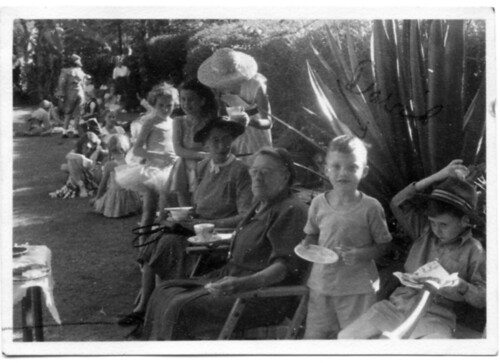The Mayoress' Tea Party

The Mayoress’ Tea Party
As we saw in my very first blog, The Goings On at the bottom of the Garden, my mother was confident that the colonies offered a lot more freedom of expression than was permissible in the strict conventions of England. To her, this openness, mixing of classes and cultures and modifying traditions offered huge advantages. She thrived. Before I leave the subject of tea and its importance in our society from everyday early morning tea to formal functions, I’d like to share with you some snaps and memories of the first Mayoress’ Tea Party my mother hosted in our garden at 1 Silver Oaks Road.
Do you remember, or recognize anyone from the pictures? Let me know. I so look forward to your own reminiscences and reactions.
The Mayoress’ Tea Party
One of my mother’s duties as mayoress was to host the annual Mayoress’ Tea Party. Usually a rather staid affair at the hotel, Mom decided to put some fun into it. Why not spread the joy?
She knew it wouldn’t be easy to persuade my Dad. She, however, had a talent for choosing just the right moment. The perfect opportunity presented after a rare good night’s sleep, and a good breakfast: half a pawpaw with a squeeze of lemon followed by a bowl of hot Maltabella porridge with barely a sprinkle of brown sugar and a splash of milk. “I was thinking we might host the Mayoress’ Tea Party here at home: a garden party. We’ve such a lovely setting for it,” she ventured.
“I don’t know about that. What about the catering? It’s got to be top notch, and you’ll be preoccupied with your duties as mayoress.”
“Yes, I’ve thought of that. What about asking WIZO (Womens International Zionist Organization) to cater it? We could make a generous contribution to the Synagogue Fund. It would be an opportunity to showcase their special sweets.”
“That’s just the job! Yes, approach them. You know they all love you to bits.”
“I was thinking too, we might ask the Girl Guides to be the servers. That would free up the Jewish community to enjoy the tea itself after all the preparation. We’ll make a donation to the Guiding fund. They could really use it, too.”
“Alright, then” he said, reluctantly. “You’ve though of everything as usual. The Jewish community has been my stalwart support in the campaign: everything from posting posters and licking envelops to canvassing, besides financially, of course. They’ve earned a tea and then some.”
“Good.” she said. “I was thinking too,” she ran on, “of making it a fancy dress party, an opportunity for everyone to let their hair down.”
“Let their hair down? Why would we want to do that? It’s a hat and tie event.”
“It could be that too. Let’s invite whole families. The children can come in fancy dress.”
“Normally children are seen and not heard.”
“This way they will enjoy a bit of make-believe. We could all use a bit of that. The garden’s big enough after all.”
“It’s an opportunity first of all to thank supporters and win over the opposition. I’ve got so many plans to put into operation and make no mistake it won’t be easy. I don’t want to cloud it with a lot of your make-believe.”
“People are much more receptive, you know, open to suggestion, when they are having fun, relaxed.”
“Of course I’m not entirely comfortable with this idea of yours, but people will do anything for you, it seems. I wish it was so easy for me.”
“What more confirmation do you want?” she shot back. “It’s all settled then,” she quickly wrapped up the discussion. “Leave everything to me. I know you’re busy.”
With one of their own running the town’s affairs, WIZO showcased what they could do. The length of the verandah was filled with Jewish dainties from all parts of Europe: Mrs. Phillipson’s Black Forest cake, Mrs. Teperson’s cheesecake, twists of teiglach from the Goldberg’s, crescents of rugelach from Mrs. Hatchuel, triangles of hamentaschen from the Sloman’s, chaffing dishes of blintzes, flakey apple strudel and so on. They had really outdone themselves. In addition Teperson’s Bakery contributed trays of petite fours, cream puffs and chocolate éclairs to satisfy conventional tastes.
The ladies arrived in afternoon frocks and dress hats, the gentlemen in suits and ties. The urchins, fairies, emperors and Robin Hoods pressed themselves against the hedge to take advantage of the lengthening afternoon shadows, but soon spilled out onto the side lawns and into the Wendy house to indulge their fantasies.
It was, after all, a joyous marriage of productivity and fun.

